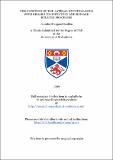Files in this item
The function of the lateral hypothalamus with regard to gustatory and reward related processes
Item metadata
| dc.contributor.advisor | Winn, Philip | |
| dc.contributor.author | Scollon, Jennifer Margaret | |
| dc.coverage.spatial | 272 p. | en_US |
| dc.date.accessioned | 2018-06-28T10:48:33Z | |
| dc.date.available | 2018-06-28T10:48:33Z | |
| dc.date.issued | 1999 | |
| dc.identifier.uri | https://hdl.handle.net/10023/14701 | |
| dc.description.abstract | The lateral hypothalamus (LH) has been shown to be involved in consummatory behaviour by a number of different experimental techniques including behavioural and electrophysiological methods. Lesion studies indicate that loss of the LH does not significantly alter normal feeding and drinking in the home cage, responding to food and water deprivation or responding to glucose or salt adulteration of the diet. However, when injected with dehydrating, dipsogenic or glucoprivic agents, the so called needle challenges, LH lesioned rats failed to respond as sham lesioned rats. This is despite the fact that the injections described induced the same deficits in homeostasis as food and water deprivation. Both sets of challenges are cued by internal visceral signals but only deprivation has additional environmental cues; animals are aware that their food or water are missing and may even anticipate its return. These different types of cues may be conveyed by different neural pathways and it has been proposed that lesioning the LH removes a pathway whereby visceral signals reach higher neural structures thus accounting for why LH lesioned rats responded appropriately to deprivation but not needle challenges. The present study examined the hypothesis that the LH acts as a gateway for signals concerning internal state to reach structures involved in behavioural planning and action. This was tested by the use of tests known to be susceptible to damage or change in the paraventricular system, responsible for monitoring the internal milieu, and frontostriatal systems responsible for behavioural planning and execution. The functions known to be dependent on the paraventricular system which were tested were conditioned taste aversion, benzodiazepine induced hyperphagia and taste perception but no deficits were found in responding in any of these procedures as a result of lesioning the LH. The functions known to be dependent on frontostriatal systems that were examined with LH lesioned rats were conditioned reinforcement and conditioned place preference but again few deficits were found. Hence, the present study failed to provide evidence to substantiate the hypothesis that the LH stands as an interface between the paraventricular system and frontostriatal systems. However, it did provide evidence that lesioning the LH induces deficits in consummatory responses dependent on the circumstances of the tests. | en_US |
| dc.language.iso | en | en_US |
| dc.publisher | University of St Andrews | |
| dc.subject.lcc | QP383.7S3 | |
| dc.subject.lcsh | Hypothalamus | en |
| dc.title | The function of the lateral hypothalamus with regard to gustatory and reward related processes | en_US |
| dc.type | Thesis | en_US |
| dc.contributor.sponsor | Biotechnology and Biological Sciences Research Council (BBSRC) | en_US |
| dc.type.qualificationlevel | Doctoral | en_US |
| dc.type.qualificationname | PhD Doctor of Philosophy | en_US |
| dc.publisher.institution | The University of St Andrews | en_US |
This item appears in the following Collection(s)
Items in the St Andrews Research Repository are protected by copyright, with all rights reserved, unless otherwise indicated.

